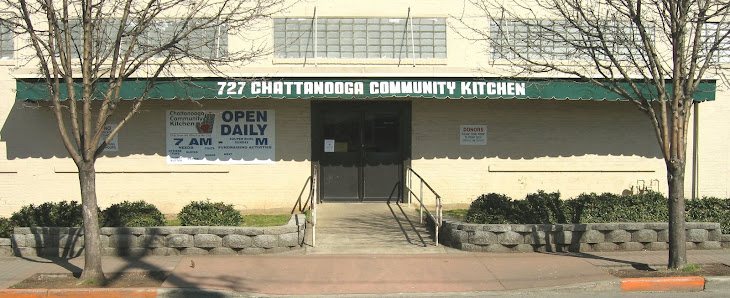When Jack first came into
the Community Kitchen
over a decade ago, he walked into the
kitchen’s Consider the Lilies Thrift Store and asked Denyce Carlock for a job.
The two are fast friends now, but at the time Denyce said he came off as
arrogant.
“Is this all you’ve got?” He asked Denyce, looking around
the menagerie of donated men’s and women’s clothes, stray lamps and alarm
clocks, sets of dishes and cookware, soap and toiletries.
Before he moved back to his hometown of Chattanooga,
Jack worked in Chicago selling
men’s clothing and shoes and made a good living doing it.
“I had a gift for gab,” he boasts. “I once sold a guy a
suit, a tie, shoes, the whole nine yards – and he was off to pay a bill!”
 |
Local artist Jack Lane and Denyce Carlock from the Chattanooga Community
Kitchen.
|
Clients often come into the thrift store asking him for
advice on what shoes to buy or clothes to wear for interviews. Even when he was homeless, he says that he
always kept himself up. Many people never
knew that he was a cocaine addict and spent his nights out on the streets.
“It’s so easy to lose it all,” he explains, “and then it’s
hell getting back up.”
Jack found it difficult to wrap his head around the
transition: from a fast-paced, high-culture lifestyle in Chicago
to scraping by on the streets in Chattanooga
and spending every waking moment looking for his next high. A graduate from Chattanooga
State Community College
with a degree in advertising and art, Jack was a top student with prospects. One of his professors even got him a full
scholarship to an art school in Memphis
where he would travel to New York
and Paris and Italy
to study.
Jack became addicted to cocaine during a long period of
unemployment. While he was studying at Chattanooga
State, he bought a house with a
school teacher he was dating. With a
mortgage and his relationship on the line, he turned down the scholarship to
art school and started looking for work in Chattanooga.
When his job opportunities started falling through and his confidence began
waning, he did not feel he could move to a bigger job market.
Jack does not really say what finally led him to walk out,
but he was chronically homeless for several years.
He made his drug money through odd jobs as a landscaper and
petty theft. In one story, Jack talks
about losing two years: his girlfriend at the time wanted to celebrate his 58th
birthday, and he insisted that he was only 56 years old until she made him do the
math.
“You have your circle, and that’s all that matters,” he
says. “Your family and friends become your enemies. The drug addicts are your friends.”
He got to the point
where he was so paranoid about what he might do when he was high or what others
might do that he started getting high alone.
He says that he does not understand what makes some people strong enough
to beat addiction while others just cannot seem to, but everyone is
different. Every once in a while, he
will remember a funny thing that happened while he was high and laugh and
laugh. For Jack, it seems like he was
almost an expert at the lifestyle – it was not living on the streets that was
hard, just what he had to give up to be there.
 |
Jack’s art work at his west
side apartment.
|
Occasionally, he would spend the night at his daughter’s
house and see his two granddaughters. He
credits his grandchildren as at least half of the reason why he was able to
beat his addiction.
“Look, Daddy, you can’t come here like this,”
his daughter told him one night. “Your
granddaughters are old enough to know, and they shouldn't have to see you like
this.”
He shares a story about waking up one day in a crack
house. There was a radio evangelist
talking in the background as he walked out, and one thing the evangelist said
galvanized him: “God gave everybody a talent, but if you don’t use it, you will
lose it.”
Five years have passed since Jack kicked his addiction. After a heated argument between Denyce and
Jack one day, he walked out of the thrift store and did not come back for over
a year. When he did return, he was
clean. A lot of people give up on you
when you’re an addict, Jack explains, but Denyce never turned her back on him.
Right now, Jack is working on a painting of a snowy egret
for Denyce, an avid bird-lover.
-
Jack
Lane is a
local artist and former client of the Community Kitchen. His works are on display at the
Bethlehem Center and he is planning an art show for May 2013 at the
Chattanooga Convention
Center. Jack volunteers at least once a week at the
Consider the Lilies Thrift Store.






